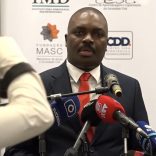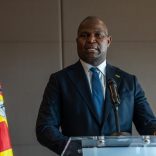Mozambique: Consolidation of democracy requires electoral justice
Figures of “international merit” to observe new phase of Mozambique peace talks – Dhlakama

Lusa (File photo) / Afonso Dhalakama
The Mozambican government and Renamo, the main political opposition party in Mozambique, will appoint figures of “international recognition and merit” to accompany the delegations in the new phase of the peace talks, party leader Afonso Dhlakama has announced.
In an interview with the weekly newspaper Canal de Moçambique, Afonso Dhlakama says that, in addition to the eight names that make up the two groups that will discuss decentralization and military affairs, the new phase of the dialogue will feature the participation of figures of “international recognition and merit”, whose mission will be to follow and verify the process during the sessions of the two groups.
“It is a figure that will enter by consensus, of merit and international recognition, who will coordinate and verify what is happening within each group,” the Renamo leader explained.
Recalling that Renamo has always insisted upon international mediation, Afonso Dhlakama says that the new groups will continue the work of the Joint Commission, which was guided by international mediators but ceased work in mid-December without achieving consensus on decentralization or on the cessation of military hostilities, two of the main agenda items.
“The mediators have done the work of approaching decentralization and the Armed Forces,” Dhlakama said, adding that, in the new phase, “there will be mediation, yes”, and that a group composed of “important countries ” is being foreseen to observe the groups’ work.
“I can not yet identify [the countries], but it will be a mixture,” Dhlakama said, adding that Renamo’s demands are not provisional and will require a constitutional revision, inasmuch as “decentralization is to enter the Constitution”.
The central region of Mozambique has been plagued by military conflicts between the Defense and Security Forces and the armed wing of the largest opposition party, which claims victory in the general elections of 2014, accusing the Mozambican Liberation Front (Frelimo), in power for more than 40 years, of committing fraud in the vote scrutiny.
In late December, as a result of telephone conversations with Mozambican President Filipe Nyusi, the Renamo leader declared a one-week truce as a “goodwill gesture,” and later extended his deadline to 60 days to make room for negotiations, which are now focused on decentralization and military affairs.
Last week, the Mozambican president announced the end of the negotiation process phase involving international mediation and, a few days later, announced the names of the individuals who will discuss these two agenda items.
To discuss decentralization, Filipe Nyusi appointed lawyers and university professors Albano Macie and Eduardo Alexandre Chiziane to represent the government. Eduardo Chiziane was a member of the government delegation in the previous phase of negotiations with Renamo.
The Renamo leader appointed lawyer and deputy Saimone Macuiana and former member of the National Election Commission (CNE) Maria Joaquina, who also took part in the previous phase of the negotiations in the, to discuss decentralization.
For military matters, Armando Alexandre Panguene, general in reserve and first Mozambican ambassador to Portugal, and Ismael Mussa Mangueira, honorary consul of Slovakia in Maputo, will represent the government, while Renamo deputy André Joaquim Magibire and Leovilgildo Buanancasso, a member of the State Council, were the Renamo choices.
The two groups are tasked with following up the work begun in the previous negotiation process, which included an international mediation team.
In addition to decentralization and the cessation of hostilities, the negotiation agenda includes the de-politicisation of the Defence and Security Forces and the disarmament of the armed wing of the opposition and their reintegration into civilian life.












Leave a Reply
Be the First to Comment!
You must be logged in to post a comment.
You must be logged in to post a comment.